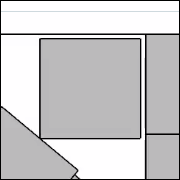|
Does anyone else's table just let players roll for some of the things that are supposed to be a secret DM roll? In both a PF2e AP I've run and another I'm a player in right now, we've let players roll things that are typically a secret DM check such as stealth checks, knowledge checks, perception checks for traps, etc. In the one I ran, I was still learning the system and continually rolling secret checks was more than I wanted to deal with, and players would often just say things like "I want to roll a recall knowledge" and would just roll themselves and it never bothered me enough to change, and moreover players often complained about the percieved loss of agency. I also rolled enemy attacks, damage, and saves publicly (which often lead to complaining about how high monster stats were, yes I repeatedly pointed out creatures are built differently than PC's). The guy currently running the game I'm playing in, he's doing many more secret checks (per the rules) and typically does monster rolls privately as well. I have no problem with this, people can run games how they want to, but I'm curious about how other groups run their games. I suppose you could have the GM roll everything and a player would never know their actual role result, and would just depend on GM description to judge if they're just terrible at something or had a bad roll.
|
|
|
|

|
| # ? Jun 4, 2024 12:25 |
|
I think the benefit of the secret roll, at least for RK, is that the player won't know whether they succeeded or not, they'll just get information. And maybe that info is right, but maybe it's wrong. Just like a real person. If they roll it themselves, and get a poo poo roll, they're going to doubt that info.
|
|
|
|
3 Action Economist posted:I think the benefit of the secret roll, at least for RK, is that the player won't know whether they succeeded or not, they'll just get information. And maybe that info is right, but maybe it's wrong. Just like a real person. If I find players doubting successes a lot more than they do their failures, I switch them to be out in the open and trust them on how their characters act. But overall if I want a setting to feel more dangerous I use more secret rolls than not.
|
|
|
|
I very rarely bother with secret checks except when foundry does it automatically for me with existing macros
|
|
|
|
I think with recall knowledge specifically it's important for things to be secret. There's interactions there with feats like dubious knowledge that kinda depend on the players not knowing whether the information they're getting is accurate or not. For stuff like stealth I think there's not really much of a difference either way, you fail the stealth roll, the DM immediately goes "You stumble and hit a rock with your foot, alerting the guard around the corner" etc.
|
|
|
|
The Recall knowledge rules are something I most dislike in 2e so I'm very happy to ignore the secret tag for it tbh
|
|
|
|
Andrast posted:The Recall knowledge rules are something I most dislike in 2e so I'm very happy to ignore the secret tag for it tbh Huh. They're one of the things I like the most.
|
|
|
|
Recall Knowledge is stupidly vague as to what it actually gives you and so it widely varies how good it is from DM to DM. IMO it should either have a specific line in the monster description as to what you get, or work similar to Battle Assessment where you can pick from a specific list.
|
|
|
|
I do wish there was more guidance for DMs about recall knowledge on monsters, since often times you're just kinda left giving obvious fluff lore that doesn't really help the players out or inform their decisions either way.
|
|
|
|
I give out a stupid amount of information with recall knowledge (they basically get the entire stat block on a critical success) because I find tactics more interesting when information is open. It is hard enough making good decisions when monsters are an unknown black box. For similar reasons I turn on metagame info in foundry so that players know enemy AC or saves once they've made an attack or forced a saving throw.
|
|
|
|
I like the Rules Lawyer’s rule on this - a recall knowledge success means you get the name and basic fluff, plus the answer to one question (e.g. weakest save, does it have an opportunity attack). A critical success means you get two questions.
|
|
|
|
KPC_Mammon posted:I give out a stupid amount of information with recall knowledge (they basically get the entire stat block on a critical success) because I find tactics more interesting when information is open. It is hard enough making good decisions when monsters are an unknown black box. Yeah I am very generous with recall knowledge for the same reason. Also it gives me an excuse to spout of off some dumb useless lore trivia about the monsters which is always fun.
|
|
|
|
boxen posted:Does anyone else's table just let players roll for some of the things that are supposed to be a secret DM roll? When we switched over to Pathfinder 2e the secret roll thing really bugged me. It didn't really make sense to me how I wouldn't know how good my character did on a lot of the secret checks. Like stealth for example, if I roll a one on stealth, to me that means my character stumbles around making a ton of noise. Making the roll a secret roll doesn't make intuitive sense because I know if I'm trying to be sneaky and do a bad job of it. You do lose some agency, but you also know how good you are at a skill so it starts putting a bottom on how bad you can feasibly do. We didn't want to change the game much since we just started Pathfinder 2e so we kept the secret rolls. It ended up not really bothering me that rolls were secret and didn't seem to affect the game to much in my opinion. Our group actually decided to increase the number of secret rolls because the rest of the group likes them. Last session we rolled death saving throws semi-secret, only the game master and the player rolling the save knew whether they failed or not. That way other characters couldn't meta out death saves and just let a character linger at death because of out of character knowledge. It worked pretty good and as medic/wizard I was running in to bring people up a lot sooner than normal. We had two people see the save so it wasn't all on the game master when somebody died, our group gets a lot of TPK's and we don't want the game master to be influenced to pull punches.
|
|
|
|
Coming from D&D5e the way some players will try to hatchet skill checks over and over until they get useful intel on their opponents and circumstances are definitely a thing, so I appreciate PF2e's attempts to square that circle. I think it's a good job overall, especially because unlike D&D5e you have far clearer options and information to share. pumpinglemma posted:I like the Rules Lawyer’s rule on this - a recall knowledge success means you get the name and basic fluff, plus the answer to one question (e.g. weakest save, does it have an opportunity attack). A critical success means you get two questions.
|
|
|
|
gurragadon posted:Making the roll a secret roll doesn't make intuitive sense because I know if I'm trying to be sneaky and do a bad job of it. I think there are plenty of reasonable scenarios where a character is trying to be sneaky(and many other kinds of checks) and doesn't immediately know if they were successful or not, and that uncertainty can create interesting tension. There could even be situations where they were clearly observed, but the NPC might have a reason to pretend that they saw nothing in order to deceive the players! That kind of scenario becomes impossible if the players can see "oh I definitely rolled a 4". I think in general the secret roll makes sense if the players are trying to discover hidden information (you can't always know what you don't know), or to create deception (intuiting the state of something else's mind is a kind of hidden information too). There are however probably a lot of situations where the GM can rule that the result is going to be immediately obvious anyway, so the secret roll isn't necessary for the sake of moving things along and allowing players to throw their own dice. Scoss fucked around with this message at 22:21 on Apr 3, 2023 |
|
|
|
With knowledge checks it seems like you'd have some idea if you are remembering that class really well, or just grasping at straws. If you are a Mastermind Rogue you're going to know if you aced it or hosed up, because if you succeed the creature is flat footed, and if you crit they are flat footed for a full minute. Speaking of mastermind rogue, I recall knowledge often for flat footed, but the knowledge mostly doesn't change what I'm going to do. Get 'em flat footed and then stab 'em. What is the best information to ask for to help out my allies? Immunities and resistances is what I usually go for, so the spell casters don't waste spell slots on forms of energy they are immune to. But maybe weakest save would be better? Help them figure out what spell has the best chance to break through? I tried weaknesses but it seems like hardly anything has weaknesses.
|
|
|
|
I play recall knowledge as "success gives best and worst save, AC included, maybe a weakness or resistance if it's vital to how the fight is supposed to be played" and more info comes on a crit success. Crit failure is counterproductive in my mind because it already costs an action and is functionally required for casters to function properly, so lying double punishes people for the temerity of trying to vary their approach and because I ignore the part where I'm supposed to lie, I let it be a public roll
|
|
|
|
I give them what the action says to do - something notable on a success, something nuanced on a crit. Seems to work good
|
|
|
|
Some of the funnest roleplaying I've done has come from having my character be absolutely stubbornly certain about something they knew was true (because they rolled a 1). Granted this was in a 4e game. GM for the AV game I'm in wants us to roll secret in Foundry though so 
|
|
|
|
Scoss posted:I think there are plenty of reasonable scenarios where a character is trying to be sneaky(and many other kinds of checks) and doesn't immediately know if they were successful or not, and that uncertainty can create interesting tension. There could even be situations where they were clearly observed, but the NPC might have a reason to pretend that they saw nothing in order to deceive the players! That kind of scenario becomes impossible if the players can see "oh I definitely rolled a 4". Yeah, I kind of warmed up to it and thinks it works pretty well for the gameplay. But I still don't get how I don't know how I did at something. In the situation you described I would still be a bad sneak, who knew I was a bad sneak, but the opposing check would be a deliberate perception fail on the observer's part. Now it's up to me as the player who knows I did a bad job sneaking to decide whether I believe the guard didn't see me. It clicked for me first with secret information and recall knowledge rolls because I know that I'm rolling from a skill. I know I'm pretty good at arcana, so I probably won't mess up, but I like that the secret roll gives you the chance to confidently misremember something. Our GM was able to use that as a way for me to misuse sleep on a dragon by saying that my character was confident that they were super weak to sleep. (I had made a big deal of using sleep on some enemies earlier that session) The dragon wasn't but I didn't know because I didn't see my one that I rolled. I think it feels bad because it seems to work against the character most of the time. Our group does a lot of in character rivalries and ribbing each other so were able to play it off by the group clowning on me for it. So, I guess secret rolls are a land of contrasts, but I think they are a good addition at least partially to the game. Kitfox88 posted:Some of the funnest roleplaying I've done has come from having my character be absolutely stubbornly certain about something they knew was true (because they rolled a 1). Granted this was in a 4e game. GM for the AV game I'm in wants us to roll secret in Foundry though so This is how our group used to play if off because a few players were aggressively anti-meta knowledge. It comes off as more comical usually to me when the roll isn't secret, there both fun in different ways. gurragadon fucked around with this message at 22:48 on Apr 3, 2023 |
|
|
|
I think it's a question of how much regular session-to-session annoyance or dissatisfaction it causes vs how often the secret rolls actually 'pay off'. Which obviously is going to vary group to group.
|
|
|
|
Stealth should be secret because you're also looking at the perception and senses of various possible observers. It's good if the party doesn't know it's succeeded one bad roll sometimes. Even with a secret roll sometimes the GM can just declare that you've loudly clattered. Other times you might not hear what you did but the monster did
|
|
|
|
Also, sometimes people are just bad at knowing how much noise they're making. You've tuned out that slight sniffle you've got, or you're stepping a little heavier than you think you are, but someone else will absolutely notice it. Someone really skilled in it is gonna have a better idea of that, yeah, but can still slip up.
|
|
|
|
had my first pf2e session in Foundry. Pretty seamless transition from Roll20, people seemed to be having a good experience with it. Couple of learning curve bumps, especially with maps, but it was nice to have a tabletop where it felt like I knew how everything worked, and where things did what they were supposed to do.
|
|
|
|
Opened up the Demiplane Alpha Character Builder. Aside from expected roughness from being an alpha where it's rather slow in loading, overall my impressions are very favorable. Spell lists in particular are very good, and it fixes the big problem from DNDBeyond and other character builders with an elegant hybrid of "here is each step you have to take" and "overwhelming amount of noise." But it's still got a lot of cooking to do. I especially want them to retool how to add equipment because as it stands it's the exact same "tiny sidebar hope you know exactly what you're looking for already" nightmare that is the DNDBeyond inventory. Given how much more important/impactful items are in PF2e-- good lord they need to make that a priority before even Beta launches. There's also some hiccups if you pick a Feat that requires you to "double back" and say-- grab another Ancestry Feat-- and the Feat Lists definitely need filters, but I really am encouraged by the foundation set up. Optimize the speed for players and make it zippy, and really fine-tune the use and it would easily be the best builder I've seen so far.
|
|
|
|
Lamuella posted:had my first pf2e session in Foundry. Pretty seamless transition from Roll20, people seemed to be having a good experience with it. Couple of learning curve bumps, especially with maps, but it was nice to have a tabletop where it felt like I knew how everything worked, and where things did what they were supposed to do. My group did our first session of the beginner's box this past Sunday, and had a similar experience. There were some hiccups and growing pains, but the experience overall is much better than roll20 for us.
|
|
|
|
Glad to see so many new gms using both pf2e AND foundry B)
|
|
|
|
Just wrapped up our second session of the beginner box on Forge and it's been an absolute blast. First time playing a TTRPG and I really can't believe I waited this long to give them a shot. I know that Abomination Vaults is the continuation of the BB, but would it be alright to dive right into Blood Lords? Our DM is DMing for the first time with the BB but is currently a player in an AV campaign.
|
|
|
|
Ratio posted:Just wrapped up our second session of the beginner box on Forge and it's been an absolute blast. First time playing a TTRPG and I really can't believe I waited this long to give them a shot. Blood Lords has some requirements for player characters, which you can find in the free player's guide here, but if your characters fit them, it should be fine! To summarize the big no-gos, positive energy is banned in the entire country (meaning most heal-font clerics aren't likely to work out) and good-aligned champions are a bad idea.
|
|
|
|
A thing that's easy to miss is that undead PCs have the 'basic undead benefits' trait which is different from regular undead. Most importantly for players, it means that while healing with the Positive tag doesn't work (clerics and potions of healing) , the Medicine skill works fine, as do elixirs of life.
|
|
|
|
Treat Wounds only works if you have the feat 'Stitch Flesh'.
|
|
|
|
bewilderment posted:A thing that's easy to miss is that undead PCs have the 'basic undead benefits' trait which is different from regular undead. Most importantly for players, it means that while healing with the Positive tag doesn't work (clerics and potions of healing) , the Medicine skill works fine, as do elixirs of life. "harm" also works to heal you. Also if you go to 0 hit points, do do gain the Dying condition, but Stabilize doesn't work on you. Rules are here, and are a pretty good attempt to make an undead character actually playable. https://2e.aonprd.com/Rules.aspx?ID=1694
|
|
|
|
Rythian posted:Treat Wounds only works if you have the feat 'Stitch Flesh'. edit: fart, the "living creature" target means this is unsettled. leaving the below for posterity Wrong, actually! This is an easy mistake to make! You are correct that Stitch Flesh as a feat is required to treat Undead creatures. However, PC undead do not have the regular undead relation to healing. They instead have 'Basic Undead Benefits'. That section notes: "Negative Healing: You are damaged by positive damage and aren't healed by positive healing effects. You don't take negative damage and are healed by negative effects that heal undead." Treat Wounds does not have the Positive trait, and so you can use it on a PC that has Basic Undead Benefits without issue. You don't need Stitch Flesh. bewilderment fucked around with this message at 14:07 on Apr 5, 2023 |
|
|
|
I've had this argument a lot, and plenty of people disagree about how this works. There's multiple threads on the Paizo forum of people arguing one way or another, about what spells work, what healing works, etc, etc. The main argument really boils down to if Basic Undead Benefits overwrite the Undead trait, or they are both active, and if an undead character counts as "living creature". The way I read it, a skeleton ancestry has the undead trait. It's right there in the tags for the ancestry. And Stitch Flesh has the text "You can use Treat Wounds to restore Hit Points to undead creatures, not just living ones." A Skeleton ancestry IS an undead creature. So therefore, Stitch Flesh would be required to use Treat Wounds on it. Similarly elixirs of life has in its text "Elixirs of life accelerate a living creature's natural healing processes". A skeleton is not a living creature. Now, obviously, this is all down to how you read things. If you go by the idea that the undead trait isn't applicable for Skeleton (despite it being there) and instead only Basic Undead Benefits count, you can be healed by anything that isn't positive healing - so Elixirs of Life works on you despite you not being living, same for Elixir of Rejuvenation. It also makes Stitch Flesh kind of pointless. What are you gonna use it on? Random zombie minions following you around? It definitely would make things easier for a party with a skeleton (like mine), but I can't help but feel it's a bit weird for a skeleton to be considered a living creature, that can be healed just the same as anyone else through bandages and salves and whatever, with just a standard Treat Wounds/Battle Medicine check. I'm torn, honestly. I read the rules the way it makes sense to me, but maybe it would just be easier to be more permissive.
|
|
|
|
This is why GMs exist, really.
|
|
|
|
The trade off, of course, is that if you're level 14 or under Power Word Kill does gently caress all to you.
|
|
|
|
Stitch flesh is a dumb feat tax for basic functionality so I'm definitely running that as a baseline feature
|
|
|
|
it's the boring treat wounds feat. The fun one is Risky Surgery
|
|
|
|
Yesterday my abomination vaults game ran into the floor 4 superboss The Voidglutton. God drat that thing does not gently caress around.
|
|
|
|

|
| # ? Jun 4, 2024 12:25 |
|
Does risky surgery work with battle medicine?
|
|
|






































